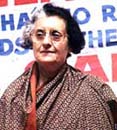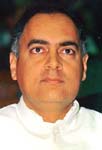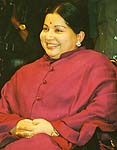
The Rediff Special /Shobha Warrier
Ayya, the man who lost out
 The world, today, knows him as Govindaswamy Karuppiah Moopanar -- the man who discovered, anew, the meaning of that classic cliche about there being many a slip between the political cup and the lip.
The world, today, knows him as Govindaswamy Karuppiah Moopanar -- the man who discovered, anew, the meaning of that classic cliche about there being many a slip between the political cup and the lip.
Back in his native Thanjavur, however, he is just ayya -- a Tamil honorific that could mean grandfather, lord, or what have you. And it is remarkable that in a fertile, agrarian area dominated by feudal landlords, there is only one ayya -- such is the pervading influence of the man.
To understand the man, it is perhaps necessary to understand his origin -- and Moopanar is a product of Thanjavur, the headquarters of the famed Chola kings, headquarters of Tamil literature and culture and, by virtue of its idyllic situation on the banks of the River Cauvery, abundantly fertile and, in consequence, amazingly prosperous.
Moopanar's parents were landowners on a scale now unimaginable. In fact, during the pre-Independence period, all of Thanjavur comprised a mere five villages, and the Moopanar clan ruled over the largest of them, Kapisthalam, spreading over 4,000 acres of the richest arable land in the region.
Moopanar was born on August 19, 1931, to Govindasamy
Moopanar and Saraswathi Ammal. And from his early days, the future political boss showed more of an interest in the fields his family owned, than in the village school that boasted his father as chief patron.
Studies could not distract his attention from farming -- but the freedom movement, then entering its climactic phase, did. Moopanar, as the son of the landlord, was the leader of the village youth -- and thus, when the Congress-led freedom struggle captured his imagination, he not only joined the party, but did so at the head of a band of enthusiastic young men from his village.
It is not surprising, then -- for politics is the art of numbers -- that Moopanar's progress from worker to president of the Thanjavur Congress Committee was meteoric in its rapidity. He held that post from 1965 to 1975, and in that time, became the second most important figure in Congress politics in the state after K Kamaraj.
Inevitably, Moopanar came to Kamaraj's notice. "Moopanar," points out political analyst Cho S Ramaswamy, "is, and has always been, a very straightforward person, and remarkably uniniterested in running for office, preferring instead to concentrate on party work. And these were precisely the qualities that Kamaraj wanted in a right hand man, so it is not surprising that Moopanar, in the state Congress hierarchy, became second only to Kamaraj himself."
 The split of 1969 saw Moopanar, like Kamaraj, staying faithful to the parent boy. It was only in the mid-seventies, when in a mammoth rally in Madras, Indira Gandhi formalised the merger of the Congress-I and Congress-O, that Moopanar came under her wing. And almost immediately, Indira Gandhi elevated him to the post of president of the state Congress party.
The split of 1969 saw Moopanar, like Kamaraj, staying faithful to the parent boy. It was only in the mid-seventies, when in a mammoth rally in Madras, Indira Gandhi formalised the merger of the Congress-I and Congress-O, that Moopanar came under her wing. And almost immediately, Indira Gandhi elevated him to the post of president of the state Congress party.
Fortune played a dirty trick on Moopanar, however -- for his rise to the top spot in the state party organisation coincided with the dramatic emergence and spread of the Dravidian movement. And swept before that wave, the Congress -- once the largest political party in the state - found its influence rapidly waning, despite all Moopanar's best intentions and undoubted talents for organisation.
Paradoxically, however, Moopanar's influence in the national politics of Delhi rose even as his star waned in his native state -- and again, the chief reason for that was his total lack of interest in power and pelf. For Indira Gandhi, battling against the ambitions of her partymen, a leader who cared nothing for office was a godsend -- so it was no wonder that she asked him to shift his base to the national capital, installing him as general secretary of the All India Congress Committee, a post he held from 1980 to 1988.
First Indira Gandhi, and then her son and successor Rajiv Gandhi, found in Moopanar the ideal troubleshooter. With no personal axe of his own to grind, Moopanar was the best possible person to despatch to party troublespots where, given his ability to listen patiently and speak only when he really had something worthwhile to say, Moopanar time and again effected patchups and reconciliations where a lesser man would have failed.
There was, it must be pointed out, one other reason for Moopanar's position in the Congress hierarchy -- where 90 per cent or more of the Congress leaders owed their constituencies and political clout to first Indira and then Rajiv, Moopanar was one person who had a strong, unshakeable political bastion of his own. His father was by then no more, and Moopanar had assumed the headship of the clan -- which in turn made him, for the people of Thanjavur, ayya, the man whose word could never be questioned.
Throughout his career, Moopanar has always played kingmaker -- without ever aspiring to don, in his own right, the mantle of office. Thus, it was Moopanar who, more than any other, was responsible for the elevation of Rajiv Gandhi to the prime ministership on the assassination of his mother. Interestingly, Rajiv Gandhi, that product of public school culture, who owed his elevation to Moopanar's ability to manipulate men, found it difficult to get along with the laconic Moopanar who, in dress and deportment, resembled more the feudal village landlord than the powerful politico he undoubtedly was.
Thus, even as he used Moopanar as his principal troubleshooter in national politics, Rajiv Gandhi sought to undercut his influence in his native state by elevating arch rival Vazhappadi Ramamurthy to the post of TN Congress president. The move had another rationale to it -- in Gandhi's view, the Congress survival in TN was linked to the fortunes of the AIADMK. Moopanar, for his part, has always been anti-that party, while Ramamurthy was on very good terms with both M G Ramachandran and, following his demise, with Jayalalitha Jayaram.
If Rajiv Gandhi did not have much use for Moopanar, then his wife Sonia most definitely did -- perhaps because she saw in Moopanar just the sort of disinterested leader her husband, surrounded by power-seekers, needed. Ironically, it is that very empathy, between Sonia Gandhi and Moopanar, that has now gone against the latter, and become the main stumbling block in the way of his rising to the office of prime minister.
 Interestingly, not only Rajiv Gandhi but also P V Narasimha Rao owe their elevation to the top slot to Moopanar's efforts. The Tamil Nadu strongman, in fact, served for the five years of Rao's reign as a strong buffer, protecting his political boss from attacks both within and without, keeping the recalcitrants in line and fending off several attempts to depose Rao.
Interestingly, not only Rajiv Gandhi but also P V Narasimha Rao owe their elevation to the top slot to Moopanar's efforts. The Tamil Nadu strongman, in fact, served for the five years of Rao's reign as a strong buffer, protecting his political boss from attacks both within and without, keeping the recalcitrants in line and fending off several attempts to depose Rao.
Ultimately it was state, and not national, politics that severed Moopanar's almost five-decade-long association with the Congress. In the run-up to the 1996 general election, Moopanar tried to impress on Rao that with Jayalalitha under the cloud of corruption, the time was ripe for the Congress to fight the electoral battle alone, and recoup lost ground.
Rao, desperate to gain as many seats from the southern states as possible, was, however, in favour of an alliance. Moopanar then suggested that the Congress ally with the DMK, which he saw as the lesser of two evils. However, Rao ignored that advice and went with Jayalalitha -- prompting Moopanar to break from the Congress and found the Tamil Maanila Congress.
How well tuned he was to the political mood in his native state was evident when the TMC, in alliance with the DMK, swept the AIADMK-Congress alliance off its feet in unprecedented fashion. And Moopanar, for the first time in his political life, found himself in Delhi not as a backroom boy, but as leader of an important political party in his own right.
True to character, Moopanar never did attack his erstwhile party, or its leader P V Narasimha Rao, even after he broke away. In fact, when I met him soon after the formation of the TMC, what I found was not an exultant, but a forelorn, leader. I asked him about Rao. "Till yesterday, I was calling him my leader," Moopanar told me then. "Now I
don't want to say anything against him." Typical of Moopanar who, despite his rustic origins, has remained ever the gentleman.
It is this characteristic that has earned Moopanar friends cutting across political boundaries. Even Vazhappadi Ramamurthy, one of Moopanar's few critics, tempers his criticism with words of reluctant praise. "Moopanar is a man of few words, he has never reacted to my criticism," Ramamurthy said. "And for my part I have no personal antipathy towards him, it is just that we don't see eye to eye on certain issues to do with politics."
Another senior Congress leader, who has known Moopanar from the sixties and who does not rank among his admirers, calls him a consummate politician. "When
I say that, you can come to your own conclusions. He knows how
to play the game, he can get things done without hurting anyone," is the leader's assessment.
Cho Ramswamy, for his part, has known Moopanar from the seventies on, and rates him as one of the few gentlemen remaining in politics. "He is a very well
meaning person. His strength is, he is a gentleman, and that could also be his weakness. He does not know how to hit below the belt in a fight. If
wronged, he is capable of settling scores with the person who
wrongs him, but only in a very straightforward fashion. As the troubleshooter
for Mrs Gandhi and Rajiv Gandhi, he must have gained a clear perspective
of national politics. Since his apprenticeship was under Kamaraj,
he acquired this ability to manage men and organisations. I would rate him as the most respected politician in TN right now."
 In his career, Moopanar has never contested any election, nor has he accepted government posts at either the state or central level, barring his seat in the Rajya Sabha. He has a marked penchant for remaining behind the scenes, and confesses that at this late stage in his career, his ambitions are more state-centric than national. "I would, before my political life ends, like to bring back Kamaraj rule to TN," Moopanar said recently.
In his career, Moopanar has never contested any election, nor has he accepted government posts at either the state or central level, barring his seat in the Rajya Sabha. He has a marked penchant for remaining behind the scenes, and confesses that at this late stage in his career, his ambitions are more state-centric than national. "I would, before my political life ends, like to bring back Kamaraj rule to TN," Moopanar said recently.
And perhaps now that the national prize has eluded him, Moopanar just could satisfy his legion of followers in TN by doing what he has, thus far, steadfastly refused to do -- and that is to set his sights on the chief ministership of his native state...
Tell us what you think of this profile
|





